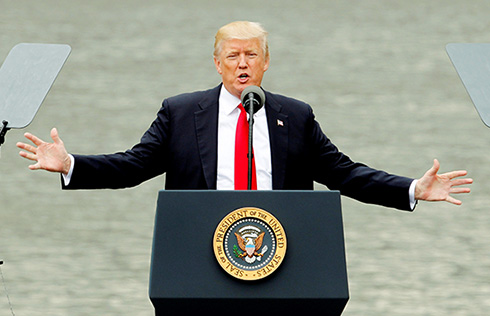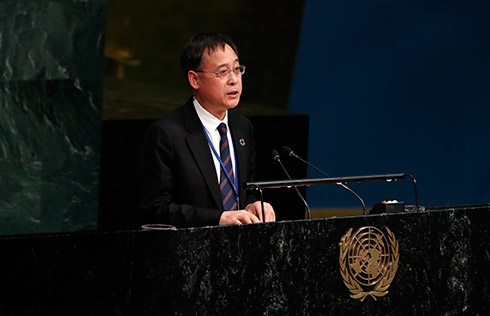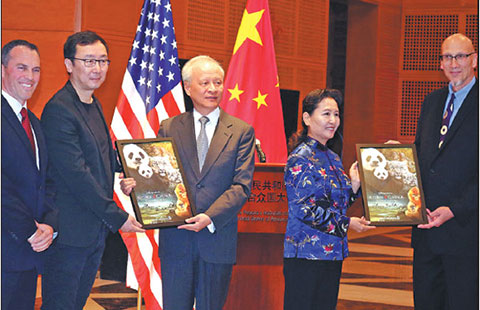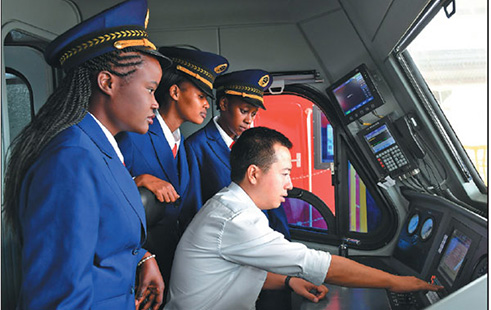Nation seeks stronger water conservancy cooperation
China is seeking increased support from international financial institutions, including the Asian Infrastructure Investment Bank, to expand water conservancy and hydropower cooperation with countries along the Belt and Road, according to a senior water resources official.
Based on an analysis of other countries' needs and China's advantages, the nation will propose key areas and approaches for this cooperation, Liu Zhiguang, director of the Ministry of Water Resources' department of international cooperation, science and technology, said in an interview.
Chinese businesses will also be encouraged to participate in the cooperation to boost local economic growth, Liu said.
China has built a comprehensive flood control and drought relief system with 410,000 kilometers of river dikes and 98,000 reservoirs, according to the ministry.
With 6 percent of the world's fresh water and 9 percent of the world's arable land, China feeds 21 percent of the world's population, Liu said, adding that China has attached increasing importance to environmental protection when planning and constructing water conservancy projects.
To share its experience, China has signed water resource-related cooperation agreements or memorandums of understanding with more than 10 countries involved in the Belt and Road Initiative, and drafted cooperation plans with 13 others.
Twenty-three institutions affiliated with the ministry, which are qualified to conduct overseas business, were involved in 1,394 projects with a contract value of around $2 billion in more than 70 countries or regions from 2011 to 2016, according to the ministry.
Liu said that many of the projects have won praise from local governments and the public.
For example, the Coca Codo Sinclair hydroelectric facility in Ecuador, which was designed by Yellow River Engineering Consulting Co and constructed by the Power Construction Corporation of China, withstood a 7.8-magnitude earthquake in 2016 and offered necessary electricity for disaster relief efforts. The facility also changed the country into a power exporter from an importer.
"We expect to take the opportunity of the Belt and Road Forum for International Cooperation to establish a cooperation mechanism with more countries. We also welcome water resources officials and experts from Belt and Road countries to visit water conservancy and hydroelectric facilities in China," said Liu.
China also expects to enhance policy and technological communication and cooperation in flood control and drought relief regarding cross-border rivers, hydrological information sharing, personnel training and joint scientific research with Belt and Road countries, he said.
China has been making effort to overcome challenges that hinder its international cooperation in water conservancy and hydropower.
Some countries do not accept Chinese technical standards, and the nation still has a lack of people with knowledge of international rules and project operation in this field, Liu said.
Key standards
The Chinese government has translated 24 key technical standards related to water conservancy and hydropower, while it also encourages businesses to establish complete security management systems to improve their risk resistance capabilities, he said.
Xie Xiangrong, vice-president of Changjiang Institute of Survey, Planning, Design and Research, the designer of the Three Gorges Dam - the world's largest hydroelectric facility, said that as China is still a relative newcomer in the international market, it has yet to win recognition for its technical standards.
Few overseas water conservancy projects currently use Chinese standards, he said.
With more than 3,000 employees, the institute now has businesses in 45 countries and regions.
"The translation of Chinese standards has just started and the promotion still fails to meet the need of the Belt and Road Initiative," he said.
Xie said his institute has sent more than 120 employees to the United States for training in water resources and international project management, and organized various other training programs to deal with international projects.
However, more skilled staff are needed, especially those with expertise in coping with international economic fluctuations and political instability, the modification of contract clauses and technical standards, and expertise on collecting claim-related evidence.


























